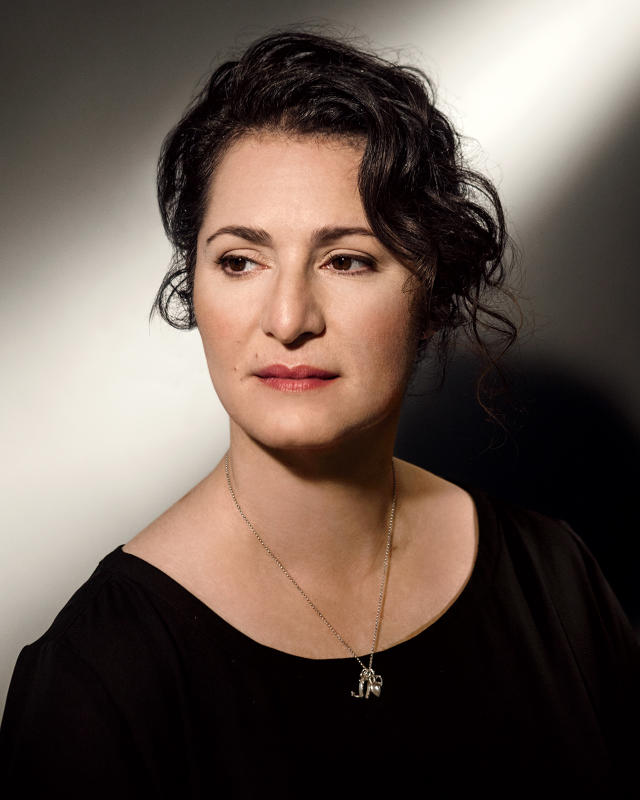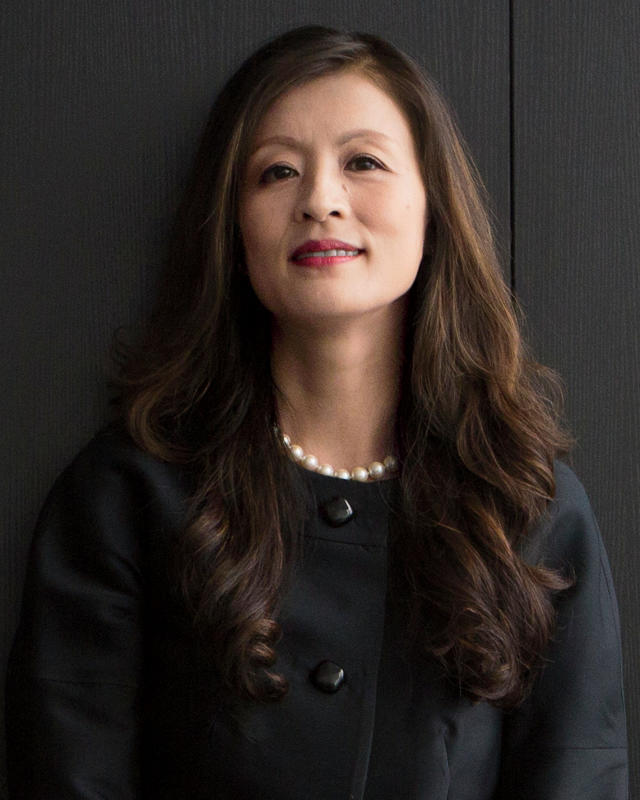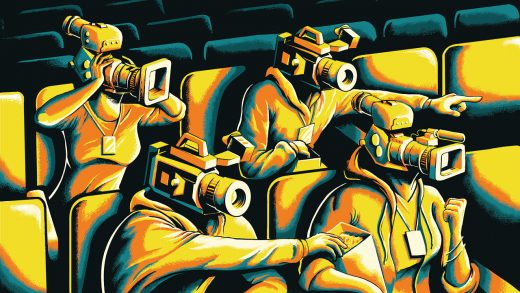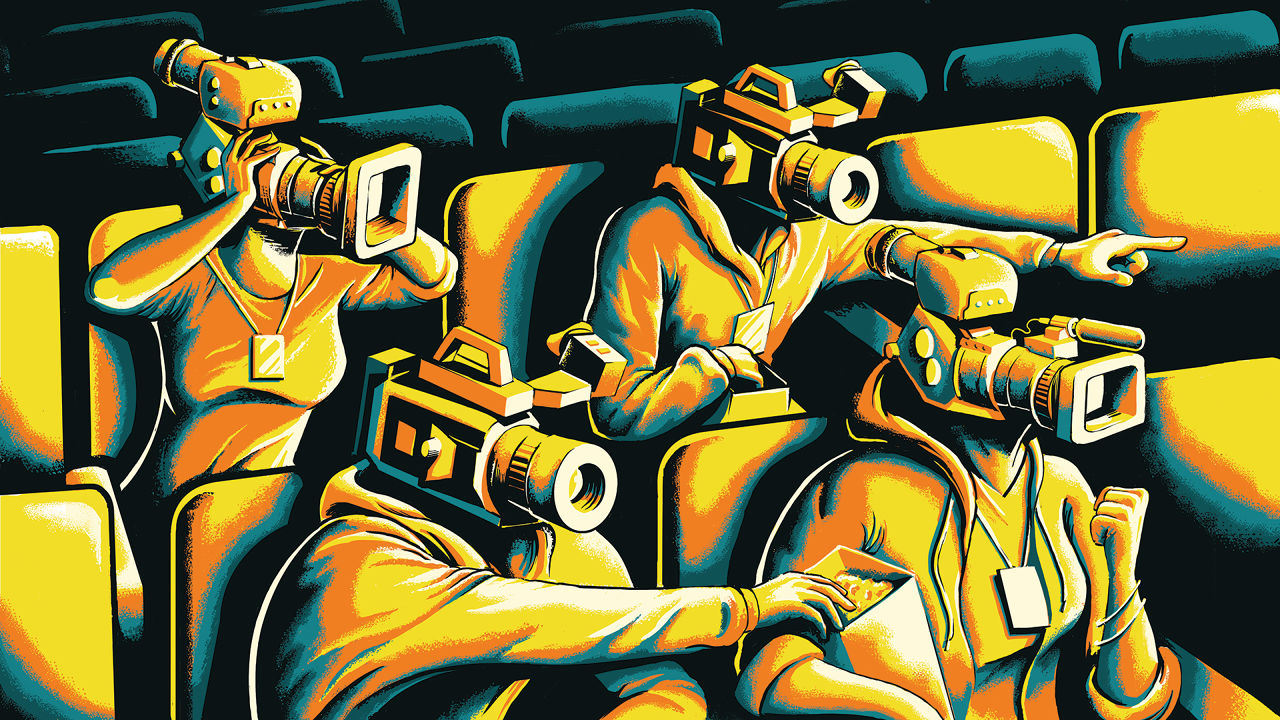Apple, Facebook, Google, And Alibaba Take Hollywood
The Imperial Hotel has been a fixture on Park City, Utah’s Main Street since it opened in 1904. Originally a spot for weary miners,it captured the imagination of Hollywood when an independent film festival came to town and its central location helped make it a hub for 10 days each January. It’s reputedly home to Park City’s most famous ghost, Lizzy, a prostitute who was killed by her husband. Legend has it that Lizzy still flirts with men there. During this year’s Sundance Film Festival, though, the Imperial was haunted by a different spectral presence: Apple.
While other tech companies craved visibility at the annual indie-cinema jamboree—Samsung set up a virtual-reality storytelling village, Airbnb staged a painstakingly curated artist’s retreat called Airbnb Haus, and Uber offered helicopter rides from Salt Lake City—Apple slipped into Sundance practically unnoticed. It set up shop in the Imperial, which was recently converted into a condo-slash–event space. Behind the now unmarked door at 221 Main, Apple hosted private, invitation-only events. On one evening, a group of young filmmakers were treated to cocktails and a farm-to-table dinner put on by the chefs from Eveleigh, one of Los Angeles’s hottest restaurants. The space was as sleek and understated as an iPhone 6S; one attendee described the decor to me as “very beige.” Unlike most Sundance brand-sponsored events, there were no press releases. There were no party pictures. There wasn’t any swag. The iTunes Lounge, as it was known to invitees, was as real to most festivalgoers as Lizzy. Says one guest who was in attendance, “They were definitely talking to the talent.”
The iTunes Lounge was in fact part of a stealth effort by Apple to establish a new, more active role in delivering entertainment. In the weeks that followed, Apple execs were in Los Angeles hearing pitches for original TV series that it plans to launch on an “exclusives” app on Apple TV and within iTunes. Apple wants to work with “triple A-list” talent, according to a source, and build up a roster of must-see shows available only on its platform. Naturally, the talks have been veiled in the utmost secrecy. Producers who have met with Apple will refer to it only as the United Fruit Company.
Apple isn’t the only tech giant zeroing in on the entertainment industry. In recent months, three of the company’s largest rivals—Google, Facebook, and Alibaba—have also amped up investment in Hollywood content, each in different ways and with somewhat different goals. Google’s YouTube has launched a new “originals” division that is pairing its homegrown talent with mainstream TV producers and filmmakers as a way to upgrade its typical fare. Facebook is urging—and even compensating—celebrities to live-stream video on its platform. And the Chinese e-commerce company Alibaba is licensing, cofinancing, and developing feature films.
The tech world’s most important players have suddenly embraced Hollywood for two reasons. First, they can no longer ignore the massive success that Netflix and Amazon have enjoyed by producing exclusive, high-quality programming. Since transforming from a DVD–by-mail service into a purveyor of buzzy series like Jessica Jones and Unbreakable Kimmy Schmidt, Netflix has morphed into a $40 billion business, amassed 75 million subscribers, and won Golden Globes and Emmys. Amazon’s forays into original video have helped Amazon Prime add tens of millions of new customers, according to analyst estimates, and awards of its own. This has stoked the competitive landscape. “They are in awe of the clout Netflix carries with both consumers and media companies,” says Blair Westlake, the former chairman of Universal Television and head of media and entertainment for Microsoft. “None of the tech companies have anything that even comes close.”
Second, they see a growing opportunity. The slow but inevitable fraying of the cable TV bundle has sparked a newly intense battle to win over audiences who have never been more in play. “If I stop paying $200 a month for cable and I’m willing to parse out my $200 a month in a more à la carte fashion, is Verizon going to get some of that? Is YouTube Red?” says Jeremy Zimmer, cofounder and CEO of United Talent Agency. “Who’s gonna get it?”
Alibaba, Apple, Facebook, and Google each want a piece of that action. They are among the richest companies in the world, with a combined market cap of $1.5 trillion, almost four times the size of the five largest media conglomerates. Apple alone, with its $216 billion in cash, could acquire Netflix, Paramount Pictures, HBO, and Warner Bros. (all of which observers have suggested CEO Tim Cook actually purchase) and still have plenty left over. But so far, none of the tech firms seem interested in buying their way into Hollywood. Instead, they want to establish their own presence. “The goal isn’t: ‘We’re going to build Netflix,’ ” says Michael Yanover, CAA’s head of business development. “It’s: ‘We’re going to build our own thing, based on our own strengths.’ ”
At Sundance, Amazon and Netflix, which rely on subscriber growth rather than advertising or individual sales to drive profitability, waved around their checkbooks, buying more films at higher prices than the usual players, according to Variety. They stoked bidding wars for festival darlings such as Kenneth Lonergan’s Manchester by the Sea (which Amazon purchased for a rumored $10 million) and The Birth of a Nation, a slavery drama (which Fox Searchlight bought for $17.5 million, a Sundance record, even after Netflix reportedly bid $20 million). As four of the biggest companies on earth join the competition in an effort to cement their hold on their audiences of more than a billion people each, Hollywood may never be the same. Here’s how their tactics are shaping up—and the implications for the entertainment industry, the tech world, and consumers around the globe.
Apple: The Star Chamber
Apple has been in the entertainment business for a long time—even if the public hasn’t realized it. Eddy Cue, the amiable Apple lifer who oversees the company’s Internet software and services, is a well-known face in Hollywood: He’s been negotiating licensing deals with the studios and networks since the birth of iTunes in the early 2000s, gaining access to content for Apple customers.
In Apple’s 2015 annual report, the company revealed $19.9 billion in revenue for its services business, which includes sales from the iTunes Store (as well as the App Store, Apple Music, AppleCare, and Apple Pay). Company executives have signaled that it sees these services—notably “apps, movies, and TV shows”—as an important part of the company’s growth strategy moving forward. CFO Luca Maestri explained why during Apple’s quarterly earnings call in January, saying that they’re “tied to our installed base of devices, rather than to current quarter sales.” Translation: Stop obsessing over new iPhone sales and look at how much quarterly revenue Apple can get out of its more than 1 billion users. The company went on to share that sales of these services are growing at a healthy 24%.
Moving into original content, then, is a logical next step for Apple. Two weeks after Apple’s earnings call, The Hollywood Reporter ran with an exclusive: DR. DRE FILMING APPLE’S FIRST SCRIPTED TELEVISION SERIES. The story described a raunchy, six-episode program called Vital Signs, created by and starring the rapper turned entrepreneur, who sold his company Beats Electronics to Apple for $3 billion in 2014.
According to five different sources who have been briefed on Apple’s plans or spoken directly to Apple executives, the company is still a bit “disorganized,” and these Hollywood principals complain that Apple hasn’t presented a coherent strategy. That said, Apple appears to be taking a “two-lane approach” to original programming. The first, which Vital Signs falls under, is a slate of short films, music videos, and documentaries that will be built around musicians and friends of Dr. Dre and his Beats partner, Jimmy Iovine, a former record executive. The idea is to use this content (such as the two-hour Taylor Swift concert movie that Apple released last December and the Vice documentary The Score in late March) to promote Apple Music, the subscription streaming service that launched last year. These originals are seen as essential in goosing Apple Music’s subscriber totals. Apple says it’s happy with the 13 million people it’s attracted thus far, but industry analyst Horace Dediu notes, “They have 860 million iTunes accounts. Thirteen million out of 860 million is not a big number. They still have some way to go.”
The second lane—which for now is more deeply undercover—is an effort to do what Amazon and Netflix have done for their tens of millions of users: offer its own original TV-style entertainment. Apple being Apple, though, it not only wants to find its own House of Cards, but it wants several of them at once.
This daunting effort is being led by Robert Kondrk, Apple’s VP of iTunes content and Cue’s lieutenant. Kondrk, who looks like a buttoned-up Moby, is a low-profile Apple veteran who has mostly been associated with overseeing music on iTunes. (In Hollywood, Kondrk’s name can elicit the response, “Who?”) Among Kondrk’s challenges is how to square Apple’s aspiration—for several massive hits at once—with the risk required. Whereas Amazon made a $250 million deal for a new series with the Top Gear stars and HBO scooped up the popular sports-and-culture maven Bill Simmons, who could have helped Apple with both original series and podcasts, Apple is “definitely more cautious,” says Eric Jackson, managing director of SpringOwl Asset Management. “They probably see that as a strength, but I think it could hurt them if they end up being too slow. By all accounts, [Amazon and Netflix] are going to keep pressing on the gas in terms of making investments in this space.”
Another concern, asserts industry analyst Dediu, is “the way Apple operates; they’re very closed.” Dediu explains: “If they work on media, they will want to have control over every aspect of it.” In Hollywood, people from various fields come together on a project basis and then separate, but Dediu notes, “Apple doesn’t work that way. They are more in line with the old-fashioned studio system. How do you cross over?” For projects like the Dr. Dre series, that closed approach may be more realistic, but even then, word leaked out and infuriated Apple executives.
In late March, Eddy Cue quietly announced Apple’s first original, an unscripted documentary series celebrating apps and starring Will.i.am (curiously, Apple chose not to make it part of its new product announcement event a few days earlier). “This doesn’t mean that we are going into a huge amount of movie production or TV production or anything like that,” Cue told The New York Times, but then reportedly left open the possibility that Apple would look for more exclusives. Hollywood sources believe Cue is merely tamping down expectations, an instance of Apple’s caution limiting the splash it wants and perhaps needs to make.
As Apple moves forward into originals, it has leverage that neither Netflix nor Amazon had when they began making original shows: a strong, positive reputation among creators. Years of cultivating celebrities to be brand ambassadors has established Apple as an artist-friendly shop. Indeed, word that Apple is buying content has spawned a frenzy of interest among Hollywood cognoscenti. Some creators are so excited by the possibility of working with Apple, one agent tells me, “people are throwing shit against the wall with them, to every extent possible.”
Although there are plenty of unresolved questions—Will Apple use its massive resources to finance shows or build its own team of development executives to shepherd projects? What’s the business model for making money from the content?—no one is too bothered by the lack of specifics. Why? “Because it’s Apple,” one manager says. “Who wouldn’t want to take that flier? Especially artists, on a creative level, are saying, ‘Yeah! Let’s stick it on Apple!’ ”
Google: The Force Awakens
One afternoon in early February, Jim Berkus, the chairman of United Talent Agency, sent out a company-wide email. Berkus had just listened to Susanne Daniels, the former programming chief at MTV who decamped to YouTube last July, talk to a group of UTA agents about YouTube Red Originals. Daniels laid out her vision for the video giant’s lineup of exclusive TV shows, movies, and music available only through YouTube Red, its new $9.99-a-month, ad-free subscription service.

“It felt like a new day in Hollywood, and [YouTube] is a big part of our future,” Berkus wrote. “We always ask, ‘When will Google buy into Hollywood and acquire a studio or network?’ The answer is they already have by their ambitious plans for YouTube.”
Berkus was worked up, in part because Daniels is arguably the most impressive TV executive to segue to digital in this era. Her career spans stints at MTV, the WB, and Lifetime. (Her husband, Greg Daniels, is part of the Hollywood in-crowd as well, as the cocreator of the American version of The Office, Parks and Recreation, and King of the Hill.) Coming from her, the message that YouTube is serious about high-quality professional content resonated in a way that Google had struggled to convey to the Hollywood establishment in the past.
Though one of Red’s first efforts was Scare PewDiePie, a scripted series built around YouTube’s biggest star, Daniels’s ambition goes far beyond short videos of Swedish millennials playing video games. She says that, as with her previous network jobs, she’s working with talent to “arc out and develop characters over a season” and understand the “art of showrunning.” For now, she’s starting with YouTubers. But beginning in 2017, Daniels plans to “sprinkle in a couple more high-profile shows with more high-profile industry talent.”
Does this mean that YouTube, which has more than 1 billion monthly users, would eventually produce shows that had no YouTuber affiliation whatsoever? “Maybe,” she says. “As we grow and we find our brand and our niche . . . I wouldn’t say no.”
Talent wranglers are excited because Daniels and YouTube are offering real money, a stark contrast from smaller digital players that “pay you $10,000 a script,” as one manager gripes. “YouTube has absolutely stepped up their price point to where they can more closely compete with TV,” says Chris Jacquemin, partner and head of digital content at WME. “They’re not necessarily going after Game of Thrones–level budgets. But they’re very competitive, certainly with the basic-cable tier.”
The money may help Daniels overcome YouTube’s long-standing perception among traditional creators. “In the past, they’ve looked at [YouTube] as a pretty effective marketing tool,” says Jonathan Perelman, a former Google and BuzzFeed executive who’s now head of digital at ICM Partners, “but not necessarily the place to go when you want to create something.” While one agent predicts that some film and TV directors may resist the idea of collaborating with YouTube stars, whom they consider “schlocky,” Perelman contends that “there’s a real opportunity to get talent to look at YouTube in a different way.”
YouTube’s new strategy is in part a bid to fend off Facebook, which over the past year has seen exploding video use and now boasts 8 billion video views a day. (As one source tells me, Facebook is “internally, the biggest existential threat at YouTube.”) It is also a defense against Netflix, which has poached homegrown YouTube star Miranda Sings to create an original series. Perhaps most important, though, it is an effort to diversify YouTube’s revenue stream—to add consumer revenue to the advertising base—in hopes of improving its reportedly break-even financial performance. Daniels won’t reveal how YouTube Red has done in the first four months since it was launched except to say that it is “meeting goals that were ambitious.” YouTube is also exploring other ways to boost profitability. According to a source with knowledge of the plans, it has been quietly developing a direct-to-consumer streaming platform that it has been shopping to media companies, much like the MLB Advanced Media technology that powers HBO Now. (YouTube declined to comment.)
Daniels says that ever since she arrived at YouTube 10 months ago, she’s been thinking a lot about the simultaneous power and fragility of YouTube’s brand. “Our core audience sees YouTube as a really positive force,” she says. “They see influencers as having social capital and themselves as having social capital for being associated with these influencers. It’s an essential, positive community.” She’ll be programming Red with those principles guiding her.
Facebook: Friends With Benefits
“So we’re on our way to the Oscars,” Whoopi Goldberg says, speaking directly to the camera. “My daughter and I, between us, have on 40 pounds of Spanx. Sixty-five, like, corsets. And we couldn’t . . . we had to have help getting in the car. Who knows what’s going to happen when we get out of the car!”
Goldberg isn’t delivering this monologue during the red-carpet proceedings or the morning after on The View. She’s live-streaming video on Facebook from the comfort of her limo on the afternoon of last February’s Academy Awards. The video received more than 2 million views, as part of a behind-the-scenes Oscars diary series that made use of Facebook’s new Live product, which allows users to create video streams that upload directly to the platform. Unlike Snapchat Stories, they don’t disappear after 24 hours but remain on people’s news feeds.
The next morning, Facebook’s head of entertainment partnerships, Sibyl Goldman—a gregarious entertainment junkie who’s done stints at Ryan Seacrest Productions and Yahoo—was pleased with the star’s efforts. Goldman says that Goldberg, whose post-limo experience, as it turned out, involved being misidentified by a fashion website as Oprah Winfrey, gave “this really nice, well-rounded view of what’s happening at an event like that.”

Facebook is giving live video a huge push. CEO Mark Zuckerberg is reportedly “obsessed” with it, and the company has been rapidly finessing its rollout. The company is also in talks with the NFL (update: in early April, Twitter signed a deal with the NFL to stream Thursday night games) and is negotiating with TV programmers about streaming live shows. Already E! is shooting a live gossip show exclusively for Facebook. Live video suggests the kind of urgency and engagement that advertisers love. And Facebook is eagerly enlisting professional entertainers to deliver it.
After the Oscars, Facebook deployed COO Sheryl Sandberg to pay a visit to all the major Hollywood talent agencies. Her mission was to urge agents to get their clients using Live, with an added bonus: Facebook would pay a select number of them. In particular, the company is after young, edgy stars—a distinction from Goldberg, Vin Diesel, and its other early adopters—who are “comfortable being unscripted and unfiltered,” Goldman tells me when we chat after news of Sandberg’s visit leaked. “People who like to riff really enjoy Live.”
Whether it’s comedians, chefs, athletes, musicians, politicians, or journalists, Facebook hopes to turn them into Live “stars” akin to YouTube celebs and will pay them based on how many times a week they broadcast. (In late March, reports surfaced that YouTube was creating its own live-streaming product called Connect.) Eventually, this could evolve into a revenue-sharing model based on ads that are served within the stream. Goldman stresses that everything is still very much in testing mode. “We’re trying to encourage partners to experiment with this new format,” she says. “Part of that is working with some partners to offer some short-term financial support.”
Like YouTube Red Originals, Live is Facebook’s latest significant push to get A-listers, and Hollywood in general, to view the platform as more than just a promotional tool. Because of its unparalleled reach, data, analytics, and targeting capabilities, Facebook has been hugely successful in getting studios and networks to make it a launch pad for trailers, sneak-peek content for event movies such as Star Wars: The Force Awakens, and even entire episodes of shows, such as Showtime’s Billions last January (though the nonexclusive deal meant YouTube and others also had the pilot). Now, though, as Facebook turns to original content created exclusively for its 1.6 billion monthly users, that very success has spawned a challenge: The entertainment industry doesn’t generally see the social network as a creative venue. The unevolved financial model doesn’t help: “The conversations that I have with our content creators is, ‘Yeah, I can do something. I can put that content on Facebook and get huge numbers,’ ” one agent says. “ ‘But what’s the monetization going to be?’ ”
Another challenge is endemic to how Facebook works. The feed, an algorithmically derived stream of content customized to each user, remains a confusing concept for programmers still getting used to the idea of releasing an entire season of a show at once. “It’s not a destination,” says one source. “YouTube made a deliberate decision five years ago to be channel based. There’s a reason for that. The [Facebook] feed is very transient. It’s tough.” In early April, the company added new updates to Live to make it more user-friendly and fun (filters, real-time emoticons), and added a Live destination page—one way it is trying to address this concern.
When I ask Goldman about this, she talks about how more than half of Facebook content is shared friend-to-friend, meaning that not only is stuff on the site highly trafficked, it travels with the valuable imprimatur of someone you know. Nowhere is this more true than in the entertainment category, she says, “whether it’s this movie trailer or this funny post.” Facebook is betting that deep engagement can help draw creators, in the same way it has drawn both audiences and advertisers.
Alibaba: Lord Of The Rings
Last September, Tom Cruise stood onstage at the Shanghai Film Center with Jack Ma, chairman of the Alibaba Group, at the gala for the Chinese premiere of Mission: Impossible—Rogue Nation. Alibaba had invested in the film and promoted it across its digital properties. “How can a man be that handsome?” asked Ma as he looked affectionately at the movie star. Ma, who is worth $22 billion, was dressed simply, in a white button-down and black pants. “You know, I’m considered the most ugly and unique-looking man in China. That’s why when I meet a handsome man, I’m always jealous.” With Alibaba behind the film, M:I 5 chalked up a dashing $86 million opening weekend in China, the biggest ever for both Cruise and the Mission: Impossible franchise.
A self-described film buff who cites Forrest Gump as his favorite movie, Ma has said that he wants Alibaba to become “the world’s biggest entertainment company.” Since raising $25 billion in a record-setting U.S. IPO in the fall of 2014 and with China galloping to surpass the North American box office next year, Ma has been looking to expand into entertainment and is hungry for Hollywood-quality content to drive purchases on Alibaba’s variety of e-commerce platforms, including Taobao Movies, its film-ticketing service.
Unlike the other tech CEOs, Ma has created his own movie production arm. Alibaba Pictures recently set up a 22,000-square-foot office in an art deco–style building in Pasadena, California, and Ma installed Zhang Wei as his Hollywood liaison and president. An elegant, Harvard MBA who started out as a TV talk-show host and once said she wanted to be China’s Oprah Winfrey, Zhang, along with Ma and other Alibaba delegates, has been very active in courting studios about producing, coproducing, and acquiring movies for Alibaba. (In October 2014, fresh off his U.S. IPO, Ma even scored that most coveted of Hollywood experiences, attending a Lakers game with WME co–CEOs Ari Emanuel and Patrick Whitesell, along with the actor Jet Li.) Alibaba has made deals with Lionsgate and Disney to bring their shows and movies to China via Alibaba’s subscription streaming services.

As of mid-March, Alibaba Pictures has yet to release its first project. While Wanda Group, the Chinese real estate conglomerate, bought the AMC theater chain in 2012 and recently acquired Thomas Tull’s Legendary Pictures for $3.5 billion, Alibaba is currently more interested in being involved in individual films. That hasn’t prevented Hollywood wags from including Alibaba in its rumor mill. After Viacom stated that it would be interested in selling a minority stake in Paramount, which released M:I 5, Alibaba has been mentioned as a likely acquirer. “Huayi Brothers has put money into STX Entertainment and other companies. Hunan TV is putting money into Lionsgate,” says Janet Yang, the Joy Luck Club producer who is working on a feature film about Ma, citing two other Chinese entertainment firms that have bought into Hollywood. “[Alibaba] wants to feel like they can effect change.”
Alibaba’s ideas about how to disrupt entertainment production may prove highly unpopular. Last fall, a company executive said that it would not hire screenwriters, choosing instead to find movie ideas from fan-fiction authors. Alibaba then expected them to cobble together scripts in an online forum. The Chinese creative community was outraged, and the company quickly walked back the comments. Coincidentally, the gambit was reminiscent of Amazon’s initial efforts to enter Hollywood via a crowdsourced script platform before it got serious and started writing big checks.
Ultimately, Alibaba may end up acting more like Netflix, which relies on a combination of algorithms and personal taste when it comes to green-lighting projects. At the outset, Alibaba’s emphasis is more on data than anyone’s golden gut. All of the information that it has amassed about its customers’ buying habits and entertainment choices will inform which movies it’ll make. “[Alibaba’s] vision of what they are going to do quite precisely calibrates to what they know will also perform well in China,” says one person who has met with Alibaba Pictures executives. “They’re very focused on fanboy, a lot of fantasy, children-related content and not a lot of other stuff.”
Ma is very much an Old Hollywood–style showman. He throws group weddings for Alibaba employees and has serenaded his company with a rendition of “Can You Feel the Love Tonight?” while wearing a long, white wig and red-and-black leather biker jacket. As Ma finds his way in the entertainment business, “Give ’em what they want” may become more than just the mantra of a quant jock but also the populist cry of someone whose prime interest is keeping his customers happy.
Before Ma attains movie moguldom, though, his company has to overcome cultural hurdles as it tries to negotiate film deals. Unaccustomed to Hollywood’s highly specific way of packaging projects, Alibaba has frustrated some of its potential partners. “They don’t really get it yet,” says one. “They’ll draw a line in the sand on something that they shouldn’t. Then they will be very flexible on something they shouldn’t be. It’s a little backward, but they’re learning.”
As with the other tech outsiders acclimating to the entertainment industry, the question of how well that process goes may come down to how badly Hollywood feels they need Alibaba. The company represents access to the fastest-growing movie market. While the U.S. box office is seeing modest single-digit improvement, China’s is thriving with a 50% increase in 2015. The Chinese film business is notoriously unfriendly to foreigners given its censorship laws, not to mention marketing challenges (trailers do not usually play before movies in theaters there) and the fact that studios have no control over release dates. By partnering with Alibaba, American studios would have a trusted partner with e-commerce and social media prowess.
“People want muscle in China,” says Schuyler Moore, a partner at Stroock & Stroock & Lavan, who worked on a $500 million deal between China’s Perfect World Pictures and Universal to fund a slate of films. “Alibaba certainly provides it.”
As the tech titans bring their rivalry from commerce and community to original content, their attempts to best one another mean that the unintended beneficiary is anyone who can create or package entertainment. Not only does the industry get even more serious buyers—in addition to Netflix, Amazon, Apple, Alibaba, Facebook, and Google, don’t forget about Verizon, AT&T, Snapchat, and Twitter—but it also has a surprising set of new collaborators.
For decades, the tech and entertainment industries have not trusted each other, insisting that the other offered far lesser value. While Hollywood hollered, “Content is king,” Silicon Valley countered with “Platform rules.” Now the two worlds are more cooperative. “Fresno’s the halfway point between Silicon Valley and Hollywood,” says ICM’s Perelman. “And while neither I nor anyone else in this business is looking to move to Fresno, conceptually there’s this understanding, like, you need us and we need you; let’s find the best ways to work together.”
A version of this article appeared in the May 2016 issue of Fast Company magazine.
(51)














